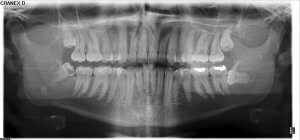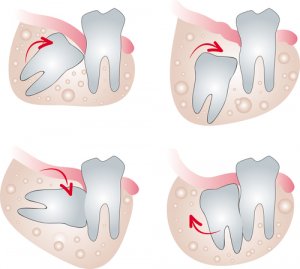Most of us have them, yet for many of us wisdom teeth remain a mystery. Perhaps it's because they stay hidden for so many years, emerge unpredictably, and often get extracted before we've had the chance to use them? In this article we'll answer all your questions about wisdom teeth (or third molars) and removal surgery, including the following:
- What are wisdom teeth and when do they come in?
- Why do we remove wisdom teeth?
- How much does removal cost?
- How can you tell if wisdom teeth are impacted or infected?
This article is an overview of the topic of third molars, and wisdom tooth removal surgery. We have separate articles on pain and recovery but for now, we will look at what's normal and what's not, and when your wisdom teeth need to be removed. Then we will get into how the removal procedure works, how much it costs, and how to schedule your own if necessary.
If you have pain or other symptoms and want to speak to a dentist, you can dial 866-383-0748 to schedule an appointment in your area as soon as possible.
In This Article
What and where are wisdom teeth?
Wisdom teeth are the last teeth to appear and grow in your mouth. They are also known as ‘third molars' in the medical world since they are the third set of molars to appear (or ‘erupt'). Wisdom teeth are located behind your second molars, where they slowly push their way through the gums as they grow. If all goes well, they will end up extending the rows of teeth you already have. However, this is often not the case.
Due to the potential complications associated with wisdom teeth, many people choose to remove them before they become an issue. The medical community is not in complete agreement about preemptive wisdom tooth removal, but it is a fairly well-established practice. Dentists do agree that if any complications arise, removal of a wisdom tooth is the best course of action.
How many wisdom teeth do you have?


Most people have four – one on the left and right of both the upper and lower jaw. However it's possible for some people to have fewer than this or none at all. In some rare cases a person can have extra wisdom teeth, up to six or even eight. This often results in a double set of extractions – ouch!
When do your wisdom teeth come in?
They typically appear much later than the rest of our teeth. While your second molars come in around age 12, the average age when you get your wisdom teeth is 17-25.
It's quite possible for these teeth to stay hidden for decades and only erupt in a person's 30s or 40s. Equally, they may never come through but also never cause any problems which require them to be extracted.
It's also worth mentioning that third molars don't necessarily come in at the same rate. For example, it's possible to have two fully developed wisdom teeth coming in from the bottom of your mouth while a top tooth is still growing. That said, if you have an extraction your dentist will likely take the opportunity to remove all your wisdom teeth, regardless of how far along they are.
Is something wrong if I have no wisdom teeth?
No, and it isn't a sign that you are lacking in wisdom either! In fact, you could even consider it evidence that you are more evolved than someone who does have them. People born without wisdom teeth can still eat perfectly well but don't have the risk of complications that the rest of us suffer.
Your dentist will be able to do an x-ray to check for the first signs of wisdom teeth coming in, but don't get too excited. Even if they don't see any third molars, it's possible they just haven't made an appearance yet. And if you really don't have any, being “more evolved” won't let you breathe underwater or read anyone's mind.
Do they hurt?


There are various reasons why your third molars might cause you pain. In this article we provide general information about wisdom teeth and the removal procedure, but feel free to check out our page on wisdom tooth pain for everything you need to know on:
- Causes of wisdom teeth pain before and after removal
- How long pain should last
- Common medications to provide relief
- Home remedies for pain
- Whether or not your pain is cause for concern
Mild pain is generally not considered dangerous, and is common when your third molars come in or for a few days after removal. If your pain is increasing in severity, you also have a fever, or you are having trouble moving your jaw, you should probably call a dentist.
Why do wisdom teeth have to be removed?
Wisdom tooth removal remains standard procedure in the US, but it turns out it isn't always necessary. There is a growing amount of research to show that routine removal may be a waste of resources. In fact, it could actually be putting the patient at risk of complications unnecessarily.
Some people naturally have enough space in their jaw and mouth to accommodate the extra teeth. They can remain in place and function normally for the lifetime of the patient. But what happens if you don't remove wisdom teeth isn't the same for everyone. The reason why these teeth are so often removed is because of the complications they can cause.
Common problems include:
- Pain while growing
- Impaction
- Tooth decay
- Infection
- Abscess
This list doesn't include problems associated with surgery, but rather issues caused naturally by your wisdom tooth coming in. You can read about other complications in our articles on wisdom tooth extraction recovery or wisdom tooth pain.
Your third molars are usually the last teeth in your mouth to erupt. If you have healthy gums, and they come in properly aligned, there is often no need to remove them. However, this is not what happens for most people.
It is necessary to remove third molars when:
- They grow in sideways, which can cause pressure against neighboring teeth and shift them
- Only partially emerge, which can cause bacteria and infection
- Don’t erupt at all and sit below the gums
Having your wisdom teeth removed can help resolve all of these issues, especially when the procedure is done soon after the wisdom teeth show signs of erupting.
Dr. Shane Porter, Premier Dentistry of Eagle
What are impacted wisdom teeth?


Wisdom tooth impaction occurs when, usually due to lack of space, a wisdom tooth can't move into its proper position and ends up aligned diagonally or even sideways. It presses against the next tooth and, if left long enough, may cause other teeth to shift position.
Fully impacted wisdom teeth are still completely covered by gum tissue whereas partially erupted teeth break through the gum but are unable to emerge fully. Partial eruption is more likely to lead to infection, gum disease or decay since there is an opening where bacteria can access the tooth.
Symptoms of impacted teeth include:
- Pain at the back of the mouth
- Jaw pain or stiffness
- Gum pain or swelling
- Pain or sensitivity around a partially erupted tooth
- Headaches
An impacted tooth doesn't always show symptoms or cause pain, though. Even if an x-ray shows that you have impacted teeth, if they aren't bothering you your dentist may well decide to leave them be. When patients are experiencing pain from impacted wisdom teeth, removal is usually the best option.
One reason to remove an impacted tooth sooner rather than later is that the older you get, the further your wisdom teeth roots develop and the more dense the bone holding them in place becomes. Removal can therefore be more difficult and lead to a longer recovery if teeth are removed later in life.
If your dentist is concerned by the position of your teeth he or she may recommend removal to prevent any complications from developing. You may also be referred to an oral surgeon for a second opinion.
Wisdom tooth decay and infection
Another argument for the removal of third molars as standard is the high occurrence of wisdom tooth decay. Because these teeth are located so far back it's difficult to clean them properly. Even people who maintain excellent oral health may have problems keeping their rear teeth clean.
It's particularly common for decay to develop between the second and third molar, and if untreated this can lead to more serious infection or a tooth abscess. Infection may also occur in teeth which have not yet erupted, especially if they are impacted.


Mild symptoms of wisdom tooth infection include, soreness and redness in the back of your jaw. The area around your infected wisdom teeth will also have some swelling. If your wisdom teeth infection is more serious, you will experience symptoms like a fever or visible abscess in the back of your mouth. Other symptoms of a very infected wisdom tooth are pus draining from the infection accompanied by a foul taste or smell.
If you are experiencing any kind of tooth pain that indicates a wisdom tooth infection, you should certainly see your dentist as complications will only worsen over time.
How are wisdom teeth removed?
Dentists can often perform wisdom teeth removal themselves in your local dental surgery. However, more complicated cases may be referred to a specialist surgeon in hospital. X-rays will indicate the position of your teeth to help plan the extraction.
General anesthesia is not typically required for the removal of your wisdom teeth but there are several ways to keep you comfortable during the procedure, all of which fall into the categories of mild or moderate sedation. Here are the options that are usually available to you:
- Local Anesthesia: This anesthetic only numbs the surgical area. You will remain awake and aware of the entire procedure, but the anesthesia will prevent discomfort.
- Nitrous Oxide Sedation: Laughing gas is inhaled through a mask and serves as a sedative and mild pain reliever. You will remain awake and feel at ease.
- IV Sedation: This method is administered into the arm and puts you in a semi-conscious state. You will wake up after surgery and not remember the procedure.
When undergoing IV sedation, you must arrange for an adult to be present during the surgery and drive you home after. General anesthesia is reserved for extensive oral health procedures like jaw surgery because it will render you totally unconscious
Dr. Eric Wood, DDS, Utah Surgical Arts
Having teeth removed is never an enjoyable process, but your dentist or oral surgeon will do whatever possible to limit your discomfort. You'll usually receive a local anesthetic to numb the area although some wisdom teeth removal surgeries are carried out under general anesthesia. If you're very nervous it's possible to request some kind of sedation.
Removing erupted wisdom teeth
Before pulling the tooth your dentist will have to loosen it in the socket. He or she will do this by grasping it firmly with a dental tool and then rocking it around or twisting it. All you should feel is some pressure at the site.
In straightforward cases this only takes a few minutes.
Removing a partially erupted or impacted wisdom tooth
If your tooth is below the gum line or has only partially emerged, the procedure is more complicated and may take longer. Surgical wisdom tooth extraction typically takes between 30 and 60 minutes.


The dentist might have to make an incision in your gum to access the tooth. In some cases a small amount of bone has to be removed, and the impacted wisdom tooth broken into pieces to make removal easier.
You shouldn't feel any pain during the removal of wisdom teeth thanks to the anesthesia you receive. If it does start to hurt, tell your dentist immediately and they will further anaesthetize the area.
Once the tooth is out, the dentist will use dissolving stitches to close any cuts that were made. These stitches should disappear within 7-10 days without you needing to return to the dentist.
The animation below explains the different kinds of tooth impaction and the techniques used for extraction:
Removing infected wisdom teeth
If your wisdom teeth are showing symptoms of infection, a dentist will generally prescribe antibiotics for some time before removal. Once the swelling and other symptoms subside, you can have your wisdom teeth removed. At this point your wisdom teeth surgery should proceed normally, whether or not they are impacted.
Recovery after extraction
It can take anywhere from a few days to two weeks to fully recover from the surgery. We won't go into detail here, but you can read our article on wisdom tooth recovery for an in-depth look at what to do (and not do) after your procedure. There you can find info on:
- At-home aftercare tips
- Activities to avoid
- Safe foods to eat
- How long recovery lasts
- Potential complications
- When to call your dentist
In general, the best advice we can give if you've had a wisdom tooth extraction is to follow the instructions given to you by your dentist. They should send you home with a list of foods to eat, as well as a timeline for returning to your normal level of activity.
How much does wisdom teeth removal cost?
The wisdom tooth removal cost differs between dentists and will depend on where you live, but the average price of wisdom teeth extraction is not cheap–around $140 to $400 per tooth.


The cost of wisdom tooth extraction also depends on how many teeth you need to have removed and how easy they are to reach. Upper wisdom teeth removal is usually more straightforward than lower and therefore may cost less. Impacted teeth will usually be much more costly, with the cost per tooth around $300 – $600. Infection also can raise the cost of wisdom teeth removal because you'll need to take antibiotics.
If you have a dental insurance policy, this should cover at least part of the cost of any necessary tooth extractions. You can call your insurance provider to ask how much of the cost to remove your wisdom teeth they will cover.
Finding wisdom teeth removal near me
Maybe you're wondering, “How much does it cost to get wisdom teeth removed at my dentist?” If so, you can call the office and ask about the price of wisdom teeth removal with them. If you don't have a regular dentist, call 866-383-0748 or click the button below to learn about different clinics in your area. You can then find out about the cost of wisdom teeth removal with or without insurance, and then decide which location is best for you.
If you are having serious symptoms of impacted or infected wisdom teeth, you should call and schedule an emergency wisdom tooth extraction as soon as possible. Wisdom tooth removal is the most common cause for emergency dental appointments and many dentists set aside time for short notice extractions.
Conclusion
Getting wisdom teeth out isn't necessary for everyone, but it's something that many adults have gone through at some point. Wisdom teeth extraction is a common dental procedure and dentists will do what they can to explain the surgery and how much it will cost, reassure you, and make it pain-free.
Although you may feel uncomfortable for a few days after the procedure, following your dentist's advice will help speed up your recovery.
Here we've put together a quick look at different wisdom tooth symptoms and what to do if you experience them:
What is happening | Symptoms | What to do |
Regular toothache | Jaw pain in front teeth or first/second molars | If symptoms get worse, schedule a checkup with your dentist |
Wisdom tooth growing | Slight jaw or gum pain in back of mouth | Tell your dentist at the next checkup |
Wisdom tooth erupting | Red and swollen gums, jaw pain in back of mouth, tooth | Call a dentist to schedule an X-ray |
Partially erupted wisdom tooth | Soreness and swelling, X-ray shows erupting tooth is impacted | Call to schedule an extraction surgery |
Fully impacted wisdom tooth | Jaw pain, gum pain, headaches - or possibly no symptoms but X-ray shows impaction | If you experience symptoms, talk to your dentist about an extraction |
Infected wisdom tooth | Increased swelling and redness in back of mouth and jaw, visible abscess or pus drainage, foul smell or taste, fever | Call for an emergency dentist appointment right away to begin antibiotics and schedule an extraction |
If you're experiencing severe wisdom toothache it's best to speak to your dentist. The pain may just be from the eruption of new teeth but if it's something more serious you will be glad to have the problem dealt with. If you don't know where to find an emergency dentist near you, we may be able to help.
If you do get your wisdom teeth removed, you can ask about your options for banking your dental stem cells – you'll be doing a great service in furthering the advances in therapeutic science and medicine.
FAQs
Why are they called wisdom teeth, and why do we have them?
Our ancestors needed these teeth because the foods they ate were much harder to chew. This wore away their teeth and the eruption of the new set let them keep eating this tough diet for longer. They did, however, have larger jaws that made it easier to accommodate all those teeth.
Another theory about the purpose of wisdom teeth is that tooth loss would have been much more common in the past, and the extra teeth were needed to replace those that had fallen out. Nowadays we have advanced dentistry techniques, including root canal treatment and dental crowns, which can save damaged teeth.
How do I find cheap wisdom teeth removal near me?
You can call 866-383-0748 to be put in touch with a surgeon near you. If you can't afford the cost, ask your dentist about a savings plan for discounts on your treatment, or a payment plan to spread costs out. Alternatively, you can check out our article on cheap dental care without insurance.
How long does a wisdom tooth extraction surgery take?
How long a wisdom tooth extraction will take does depend on how many teeth you need removed and how they come in. Impacted wisdom tooth extractions will take longer than fully erupted teeth removal. That said, once you get in the chair, your procedure shouldn't take more than 45 minutes.
Why do experts now say not to remove your wisdom teeth?
Not all dentists agree on this topic, but many experts are now saying the risks associated with surgery are enough to justify waiting until your third molars become a problem. Lots of people find that when their wisdom teeth do stop growing, they have had no issues and have grown some brand new chompers!
Are there any home remedies for wisdom teeth? Can I remove them myself?
If you are wondering how to remove wisdom teeth at home, stop right there. You can use some home remedies for pain, but the person who removes your wisdom teeth should be a professional. The risks of removing a tooth at home far outweigh the benefits of saving some money. If you are committed to home removal, read our article on how to pull your own tooth.
Can I keep my wisdom teeth after removal?
If you want to hang on to your third molars after they are removed you will have to ask your oral surgeon. Usually they will let you take them home in a small envelope. Remember that if they are impacted, they may have to be removed in pieces.
Mayo Clinic: Wisdom tooth extraction. Consulted 16th December 2020
ADA: Wisdom teeth. Consulted 16th December 2020




